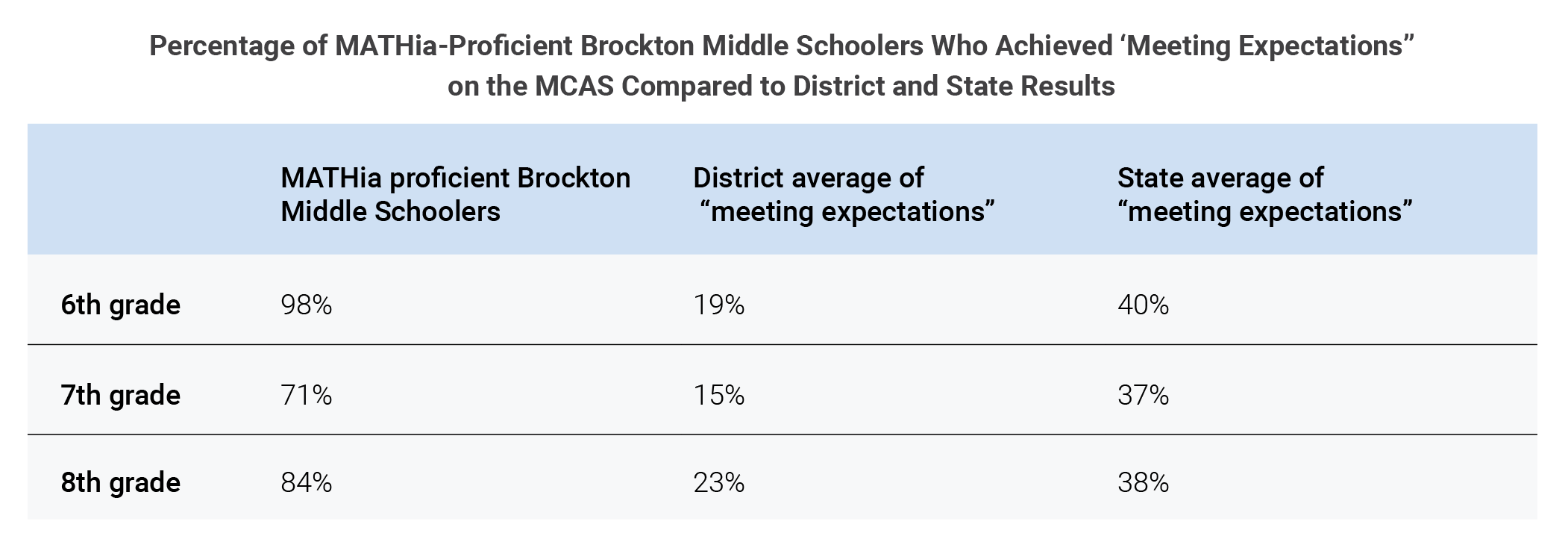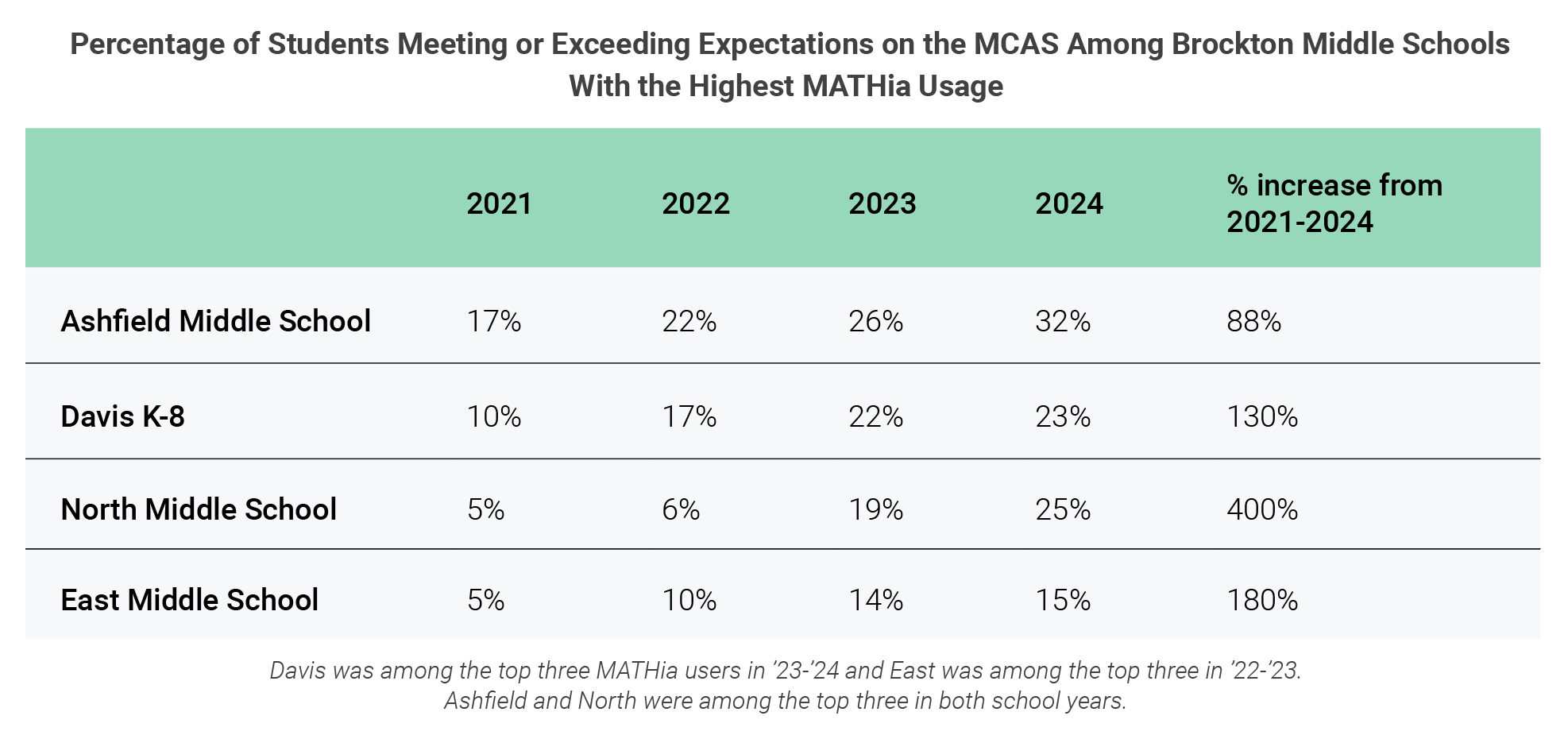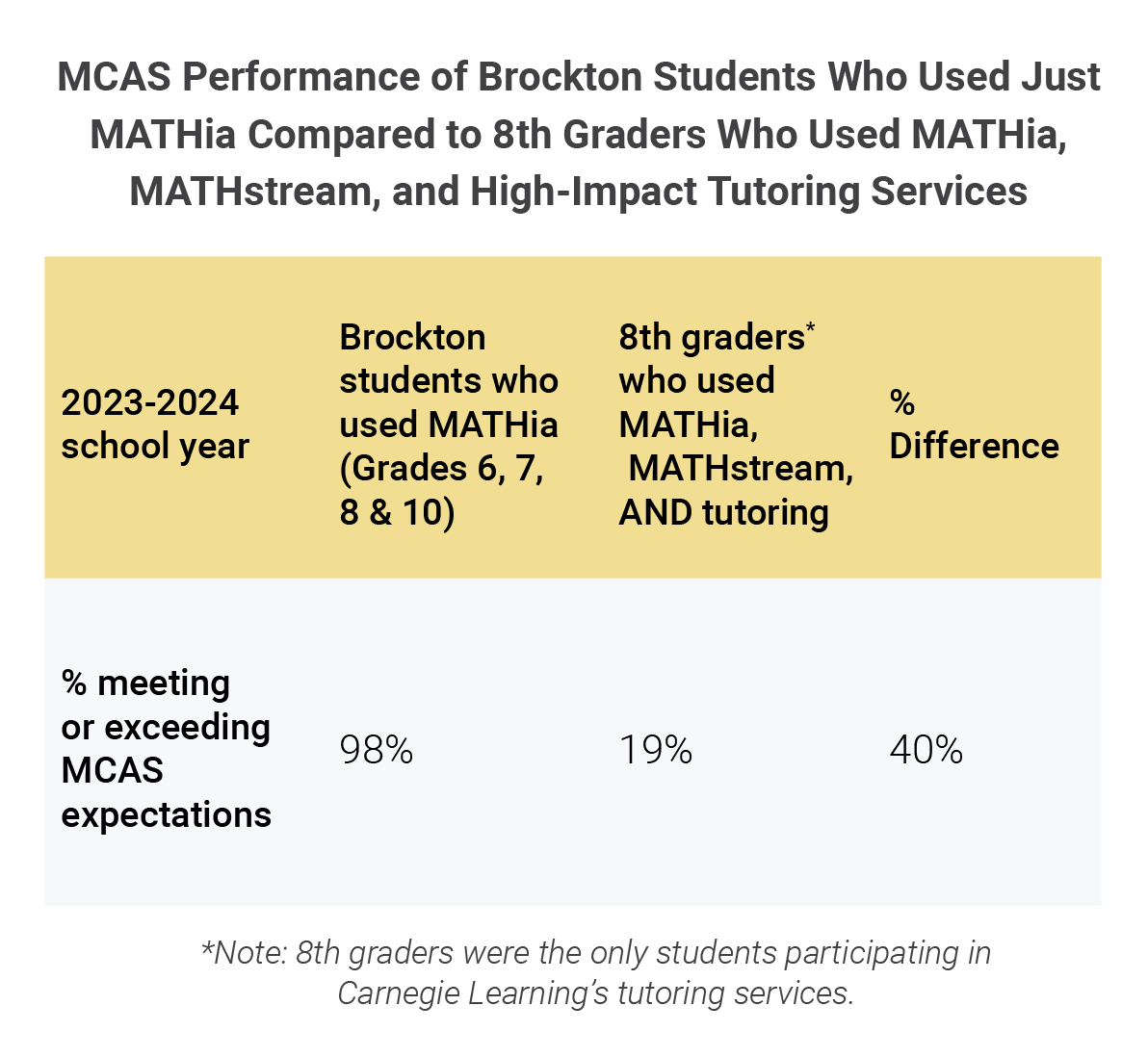400% MCAS Growth: A Title I District’s Success Story
Middle School Math Solutions That Pack a Powerful Punch
 Challenges:
Challenges:
- Lack of a common middle school math curriculum
- Between 25-28% of middle schoolers did not meet math expectations on their 2019 end-of-year assessment.
- COVID-19 led to significant learning loss, and students fell even further behind in 2021.
Solutions:
Populations Served: Grades 6-8
Results:
- Brockton middle school students have seen exceptional, continuous growth in students meeting or exceeding expectations on MCAS post-COVID, after implementing Carnegie Learning’s MSMS.
- 6th grade: 11% to 19% (2021 to 2024) (73% increase)
- 7th grade: 13% to 15% (2021 to 2024) (15% increase)
- 8th grade: 13% to 23% (2021-2024) (77% increase)
- Brockton 8th graders are passing the math MCAS at the highest rate since the state switched from the PARCC exam in 2016-2017.
- Higher MATHia usage correlated to MCAS passing rates that surpass district and state averages. At one middle school, this has helped drive a 400% increase in MCAS passing rates between 2021 and 2024.
- Students who complete a single MATHstream module gain 0.65 points on the MCAS.
A town known as the “City of Champions” can add one more triumph to its accolades—albeit one outside the boxing world. Nestled into Plymouth County, Massachusetts, some 20 miles south of Boston, Brockton Public Schools has spent the last four years quietly transforming its middle school math instruction. And the results speak for themselves.
Since adopting Carnegie Learning’s Middle School Math Solution and the supplemental MATHia and MATHstream programs district-wide, Brockton has seen a significant improvement in math scores on the Massachusetts Comprehensive Assessment System (MCAS)—including one school that’s witnessed a 400% increase in MCAS passing rates between 2021 and 2024.
“Our data really shows there’s a connection between what the students are doing in class with the Middle School Math Solution and their results on the state assessments,” explained Mr. John Lynch, associate principal of curriculum at Brockton’s South Middle School. “The students have really taken ownership of their learning.” Math passing rates at South have steadily climbed each year since adopting the Middle School Math Solution.
Facing challenges head-on
Brockton Public Schools serves over 15,000 students in the only city in Massachusetts with a predominantly black population. More than a third of their students are multilingual learners, and over half identify their first language as something other than English—including a sizeable group of students who speak Haitian Creole, Portuguese, and Spanish at home.
“ Our students speak over 30 languages,” noted Candy McGann, Brockton School District’s middle school math and science coordinator. “And this year alone we’ve received 1500 new migrant students. Some of the middle schoolers we get haven’t been in school since second grade.”
In addition to the challenges faced by multilingual learners and new arrivals, nearly one-fifth of Brockton students have disabilities, and almost 75% come from economically disadvantaged households. Instructing students from such a wide range of backgrounds can be challenging in normal circumstances. Research has shown that students with more Adverse Childhood Experiences (which include poverty, race-based trauma, and refugee trauma) have greater difficulties in school.
And then came COVID.
A 2023 report by the National Assessment of Educational Progress (NAEP)—also known as the Nation’s Report Card—found that middle school math scores plummeted in the three years after COVID. “Average scores fell to levels not seen since the 1990s, with score declines observed across nearly all geographies, socio-economic groups, and achievement levels,” wrote Dr. Ed Venit.
While a quarter of Brockton sixth graders did not meet expectations on their math MCAS in 2019, that number jumped to 45% by the time they were eighth graders in 2021. “[Before the pandemic] we didn’t have a curriculum coordinator and we did not have a district-wide curriculum. So teachers were using all different resources—TeachersPayTeachers, old books, clinical books that were hanging around, et cetera,” Mrs. McGann explained. “It was very disjointed. There wasn't a consistency of the curriculum across the district.”
A new approach in the ring
When students and staff returned for the fall of 2021, they were met by the sleek geometric cover designs of Carnegie Learning’s Middle School Math Solution and the award-winning, AI-powered math supplements MATHia and MATHstream.
Mrs. Sandra Stevenson, an 8th grade math teacher at Brockton’s Ashfield Middle School, echoed the changes she observed when the curriculum was first adopted. “We used to stress ‘label your answers, label your answers,’” she noted. “Now we're stressing different things. Instead of stressing labels, we're saying, ‘Show your work. Explain your answer. Explain your reasoning,” Mrs. Stevenson noted.
By balancing conceptual understanding, procedural fluency, and real-world applications, the Middle School Math Solution and has created natural shifts in instruction.
“The idea is to move away from stand-and-deliver instruction to the idea that there are a lot of ways students can solve math problems. It’s making sure they sometimes have the ability to fail and then learn from that mistake,” Mr. Lynch explained. “That helps students take ownership of their learning.”
The Middle School Math Solution, MATHia, and MATHstream all incorporate tenets of productive struggle in math—an instructional strategy that encourages students to make mistakes without fear of penalty. For multilingual learners and students with learning disabilities, this low-stakes approach can make building confidence in math all the more attainable.
In Brockton, schools with higher MATHia usage have seen significant gains. In 2023-24, MATHia-proficient students met or exceeded expectations on the MCAS at a higher rate than the district and state averages.

For Brockton’s North Middle School, high MATHia usage has helped drive a 400% increase in MCAS passing rates between 2021 and 2024.

A one-two-three punch
But MATHia isn’t the only tool helping students boost their success. The District also looked to our high-impact tutoring services and 6-12 video supplement, MATHstream, to help fill in gaps and accelerate learning. Whereas MATHia provides just-in-time support to students as they work through challenging math, MATHstream serves as an interactive video platform for students to learn and re-engage with math concepts at their own pace.
“We've been utilizing MATHstream more this year,” explained Mrs. Stevenson. “We’re utilizing it for the kids who struggle for intervention and re-engagement.” Students can also watch MATHstream videos at home, which frees up class time for hands-on practice.
Thanks to the combined approach of in-class instruction, re-engagement through MATHstream, and intelligent coaching through MATHia, Brockton middle schoolers have a better mastery of math than ever before. According to data from the 2023-24 school year, completing a single MATHstream module was associated with an increase of 0.65 points on the MCAS—even after adjusting for demographics, prior performance (2023 scores), and MATHia performance, which is tracked by our Adaptive Personalized Learning Score (APLSE) report.
“For three or four years we’ve been tracking APLSE scores,” said Mrs. McGann. “And there’s a high correlation between high APLSE scores and a strong MCAS performance.” MATHia’s APLSE Report (pronounced like “applause”) is an AI-driven student report that tracks key data points, like how much time students spend in MATHia, how many workspaces they've mastered, how many mistakes they make, and how often they ask for hints. A student’s APLSE score allows teachers to evaluate who’s on track to meet expectations and who may need additional interventions—like another round of MATHstream or high-impact tutoring services.
In 2023, Brockton began implementing Carnegie Learning’s high-impact tutoring services for 8th grade math students. Over 220 Brockton students participated in small-group tutoring twice weekly during the 2023-24 school year.
“Students will say something in math class and their teachers will ask, ‘Where’d you get that?’ And they’ll say, ‘Oh, I learned it on MATHstream,’ or ‘Oh, my tutor taught me,’” explained Mrs. McGann. “So we're giving students those multiple ways to access a problem and be able to do the work.”
In 2023-24, Brockton students performed even better on the MCAS when they combined MATHia, MATHstream, and Carnegie Learning tutoring services.

Stepping into the (professional learning) ring
Any teacher will tell you that the best resource in the world is ultimately meaningless without effective implementation. When Brockton chose Carnegie Learning, they knew they were getting more than a curriculum provider—they were getting a true partner.
“Carnegie Learning has boots on the ground with the teachers and leaders consistently. It's just amazing,” noted Mrs. McGann. “It is the most supportive program that I've ever worked with in terms of professional development. They’ve helped adapt our implementation to meet the needs of our teachers and students.”
Carnegie Learning has provided in-person professional learning approximately once a month for the past three years.
“It gives us that opportunity to help new teachers, evaluate if we need to make changes, or analyze new data about certain modules,” Mr. Lynch said about the professional learning services provided to his school.
“We had a couple of walkthroughs where our Carnegie Learning coaches observed students trying to explain their thinking in math class. And they’d start with ‘I agree’ or ‘I disagree,” and then just stop.” That’s when the Carnegie Learning coach suggested analyzing a transcript of questions a teacher had asked during class.
“She brought that into our common planning time at the end of the day and said, ‘Here were the questions that you asked.’” From there, teachers brainstormed more effective questioning strategies and started prompting students to add “because” to their rationales in class to better explain the mathematical concepts they were mastering.
“The coaching has made this curriculum one of those things that’s gonna stick,” Mr. Lynch explained. “This isn’t one of those education things that comes around and will be gone in a few years. We’re gonna stick with this.”
Given the incredible gains Brockton middle schoolers have made, they have good reason to do so.
Brockton’s victory lap
Whether it’s leveraging AI coaching in MATHia, watching an adaptive video tutorial on MATHstream, reinforcing concepts with a tutor, or working out of their MATHbooks, Brockton students have not only bounced back from the COVID era—they’ve surpassed their pre-pandemic math performance. In 2023, Brockton 8th graders had their highest passing rate on the MCAS since the state adopted the test in 2017. That success was repeated in 2024.
These gains are particularly significant for a district serving predominantly economically disadvantaged students and multilingual learners. The increase in passing rates represents more than just improved test scores—it opens doors to advanced courses in high school and broadens future opportunities.
“The Middle School Math Solution provides the most comprehensive level of support to help improve instruction and therefore improve outcomes for students,” said Mrs. McGann.
With plans to expand their use of Carnegie Learning solutions and continue building on their success, Brockton Public Schools sets a powerful example for districts nationwide facing similar challenges.
When it comes to middle school math gains, the City of Champions has delivered nothing short of a knockout performance.